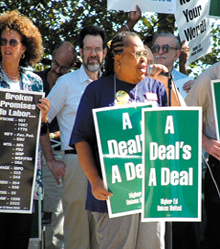Unions Stage Short Work Stoppage to Demand Contract Funding

Souvenir by Stacy Howe.
September 10, 2002
Students, faculty, and staff of UMass Boston congregated on the plaza in front of the Quinn Administration Building last Thursday to protest a recent move by acting Governor Jane Swift. In July, Swift vetoed a contract which included a pay raise of 15% over three years to Higher Education Unions statewide. Thursday’s temporary work stoppage was deemed a “community coffee break” by the united UMass unions and lasted slightly longer than the fifteen minutes scheduled. Speakers mainly focused on the theme of broken promises. The Faculty Staff Union and Service Employees International Union (SEIU) distributed signs reading “Higher Ed Unions United” and “More Work, Frozen Pay, No Way” to participants. In literature distributed prior to the walk-out to drum up support, the unions appealed to students. One question addressed on their fliers is “How does this impact the students who attend UMass Boston?” The answer they give is that “[d]espite fee increases, UMass administration has not increased resources to assist the student population.” Elizabeth Mock, president of the Faculty Staff Union, served as master of ceremonies for the series of speeches. “This is a violation we feel of the collective bargaining law and we’re very upset. The labor movement is behind us, we want the students to be with us on this issue,” Mock said. She went on to relay an experience she had regarding the UMB administration. When Swift vetoed the contracts, Mock tried to call the chancellor, but she was out of the country. So, she tried to call the provost, but “we didn’t have a provost that week.” Next, Mock called the Vice Chancellor of administration & finance, David MacKenzie, but she was told MacKenzie was downtown at President Bulger’s office. When Mock spoke to MacKenzie about what he planned to do about the state reneging on UMass contracts, Mock claims MacKenzie said that the veto made things easier for him. When The Mass Media later asked Chancellor Jo Ann Gora about the MacKenzie story Mock relayed, Gora said, “I can’t believe he would say that.” She went on to explain that the veto “doesn’t make it easier for any of us,” because the administration knows that “as long as people aren’t getting their money, morale is low.” However, MacKenzie did say that the veto made things easier for him. When asked about the story Mock told, MacKenzie said, “The issue was funding last year’s pay raises and then forcing the campous to pay for part of it without any additional state funding. That means we would have had to come up with about $7 million additional money by making cutbacks on the campus to do that.” When asked if the unions took his statement the wrong way, MacKenzie said, “I can see why they wouldn’t like what I said, but I was just being honest, it made it easier to balance my budget. I didn’t have to come up with another seven million dollars … I hope they fund the whole thing and not just a part of it.” “Well, David MacKenzie,” Mock said at the September 5 action, “this doesn’t make things easier for you, this is very difficult.” She concluded by stating, “They promised, they reneged on a deal and we’re going to hold them to it. A deal’s a deal, we want our contracts funded.” Diane Dujon, representative from the SEIU 509, welfare rights activist, and co-director of the ARMS center at UMB spoke about how faculty and staff at UMass usually don’t get “coffee breaks” like the one people were gathered for. “This is a day where we need to take this fifteen minutes to let this administration and let the legislature know, that in the state that discovered public education, we will not take these cuts lying down.” Dujon went on to describe the seven-month-long process of contract negotiations that her union went through. “It was arduous, it wasn’t a lot of fun,” she said. “But we got a contract that was fair, and we got it ratified and we got it approved by the administration, and then a year later the governor comes along and vetoes the funding of that contract,” Dujon explained. She went on to say that cuts like this are just one way in which the working class is under attack. “There should be a big difference in working for the Commonwealth and working for Enron and I don’t see much of a difference.” Dujon also indicted the press for characterizing faculty as greedy. Recent articles in the Globe and elsewhere have perpetuated a myth of high salaries and unnecessarily complaining professors. Dujon explained that very few faculty members earn $70-100,000 per year and even less staff members earn such high salaries. “So we want to set the score right. Rents are rising, health care costs are rising, the parking fee is rising, and our pay is not. We want economic justice,” she demanded. Tom Goodkind, also from SEIU Local 509 spoke next. He referred to an article on page three of the September issue of The University Reporter. “It’s by David MacKenzie, the vice chancellor for administration and finance,” and after pausing to let the boos from the crowd die down, continued, “and this article is soaking wet with crocodile tears. It is filled with apologies, it talks about how upset the administration is about the denial of funding for our contracts.” Goodkind also alleged that the university administration colluded with the acting governor in the denial of funding for the contracts. Another administrative act which did not settle well with UMass union members was a pay increase for UMass President William Bulger. “It’s our understanding that on July 1, 2001, that President Bulger received a $29,000 pay increase, that’s the same date that our contracts were supposed to be effective. Many of our members don’t make $29,000 in an entire year,” Goodkind said. Instead of hearing an apology or acknowledgement from the university’s president, the unions have heard “that he privately let the governor know that it was alright with the university administration if these contracts were not funded and it would make things easier for the administration if these contracts were not funded. People need to do something about that, we need to see some action and not just words or crocodile tears,” Goodkind said. In reference to the walk-out, Robert Connoly, a spokesman for President Bulger’s office, had this to say, “Our primary concern is that the needs of the students be met. It’s important for all five campuses to function in a smooth, professional manner.” “Funding these contracts ultimately is a political matter. Unless the Governor and the Legislature provide funding, there is no money for available for that purpose. The collective bargaining agreements say that salary increases must be funded by a separate and distinct appropriation from the Legislature. It’s troubling to suggest that staff members and perhaps non-tenured faculty members should be laid off in order to fund raises for people at the top end of the salary scale,” Connolly stated. Massachusetts AFL-CIO President and UMB alumnus Bob Haines gave his remarks while looking up at the chancellor’s office, encouraging the crowd to wave up to her. “The governor signed a contract, the Board of Trustees signed a contract and then walked away and didn’t fund it,” Haines said. “It’s time for us to get together as citizens of this Commonwealth and employees of this Commonwealth and give the message to the politicians that we won’t take it any more. We’re sick and tired of this government. We’re sick and tired of the leadership of this public university. Come together and support the people that deliver the services.” Delivering a greeting from the Higher Ed Unions United, Kathy Boudreau, president of the Massachusetts Teachers Association said, “…across 27 campuses across the state, right now, all of the Locals [local union chapters] are being represented on each campus.” Chancellor Gora was not in attendance, but later said, “I didn’t go because I have a full agenda.” She said another reason she did not go was because she was not formally invited and only found out about the action from an email that was forwarded to her. She did, however, speak with union members briefly when they came up to her office after the walk out. She was interviewing a candidate for a position when the union members arrived and she stopped that meeting to meet with them because, “I knew they were here and I didn’t want to be non-responsive,” she said. “I support the union contracts and I understand why they’re concerned,” Gora continued. She also said that one of the reasons she feels the contracts were not honored had to with the lag time since the collective bargaining agreement was reached and there are lots of things that are not being funded. “A lot has happened in eighteen months.” However, Gora indicated her feeling that Thursday’s action was not ideal. “I don’t think faculty should walk out of their classes and take students with them,” the chancellor stated, adding, “I don’t think it’s very appropriate.” Then added that because she was busy and “wasn’t looking” she was not sure if faculty had done that.










































































